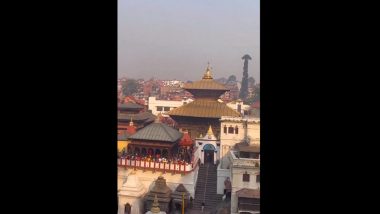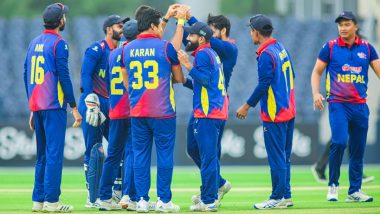Kathmandu, March 7: Priests at the fifth-century Pashupatinath Temple in Nepal are embracing technological reformations by making the internet and mobile phones an integral part of their devotional teachings. This is much evident during preparations ahead of the upcoming Maha Shivaratri celebrations, with yellow and black-robed ash-smeared sadhus now being seen sporting smartphones.
Incidentally, the temple follows a centuries-old practice of appointing Indian nationals as priests. Swami Trilochandra Ji Maharaj Ram Kathabachak, from Sitamarhi, Bihar uses his phone to preach to followers as well as remain in touch with his Ashram. He told ANI that he was gifted the phone by a disciple. Mahashivratri 2024: 62 Hindus Arrive from India to Participate in Maha Shivaratri Festival in Pakistan.
"I got this as a gift from my disciple, as I am a 'KathaVachak'. A woman became a grandmother and she had "Pota" (grandson) and on that occasion, she gifted me a mobile," the priest said. "In order to be in contact with each other we have been using it (cell phones). It has been around 10-15 years since we have been using the telephone. We got to know about mobile phones after crossing 50 years of age. But children of this age are used to these to use it since their birth. We are having unwinding benefits from mobile. It is one of the good means to be in contact with our followers," he added.
Many priests camping in and around the Pashupatinath Temple premises ahead of the Maha Shivaratri are seen chatting over video calls and giving virtual tours of the major Shiva temple in Nepal's capital city. Smartphones or mobile phones now have become a basic necessity for the Sadhus who have chosen a life apart from the society. These frequent travellers now have got into the world of connectivity through the application of the second generation of the internet are using modern gadgets and surf websites, chat on various apps including WhatsApp and other means of communication. Fasting Food for Mahashivratri 2024: From Sabudana Khichdi to Fruit Chaat, 5 'Vrat Ka Khana' To Eat on Maha Shivratri.
Sitting next to Swami Trilochandra Ji Maharaj, another Sadhu who travelled from India is seen busy scrolling the social media feed on his smartphone and sharing photos with his friends and disciples.
"We stay outside (the society). So when we come to places like this (Pashupatinath Temple), we take photos that work as mementoes for us. We are able to stay in touch with family members and show the photos to our friends back there (in India) briefing them about the places recently been to," the sadhu camping in the Ram Mandir inside the premises of Pashupatinath Temple said.
Included in the UNESCO World Heritage Site, the Pashupatinath Temple which has a great significance in Hinduism is visited by thousands of Sadhus ranging from the Naga (Naked), the Aghori-devotees of Shiva manifested as Bhairava and monists, who seek emancipation from the cycle of reincarnation to those who choose to stay away from materialistic possessions. People often reach out to them for solace as well as knowledge about religious scriptures and modes of life.
"Many Sadhus now possess mobile phones. There are rarely anyone who does not possess a smartphone, if you go and ask them each one would have a mobile phone. They also now resort to smartphones to get quick answers to a range of questions including those on Katha Bachan (storytelling) ," the priest said.
Keeping with the times the Pashupati Area Development Trust which looks after the stay, security and food for the visiting priests have now started providing mobile charging services for them. However access to internet remains off the table.
It is perceived that Sadhus come to Pashupatinath during Shivaratri for meditation and spiritual pursuits and the addition of internet services is perceived to be a distraction. Over the years, authorities in Kathmandu as well as the government itself have made announcements to set up free internet hotspots around heritage sites. However, it has failed to come into practice.
One of the major festivals of Nepal, Maha Shivaratri literally means 'Night of the Shiva'. It is celebrated on the 14th day of the dark fortnight of the Magha month, as per the Hindu lunar calendar. Maha Shivaratri marks the convergence of 'Shiva' and 'Shakti' and also celebrates the night when Lord Shiva performed the 'Tandav' - the cosmic dance.
This year, the Pashupati Area Development Trust said it expects over a million devotees to flock to the temple. It is believed that on this day, the stars in the Northern Hemisphere are at the most optimum positions to help raise a person's spiritual energy.
(This is an unedited and auto-generated story from Syndicated News feed, LatestLY Staff may not have modified or edited the content body)













 Quickly
Quickly






















